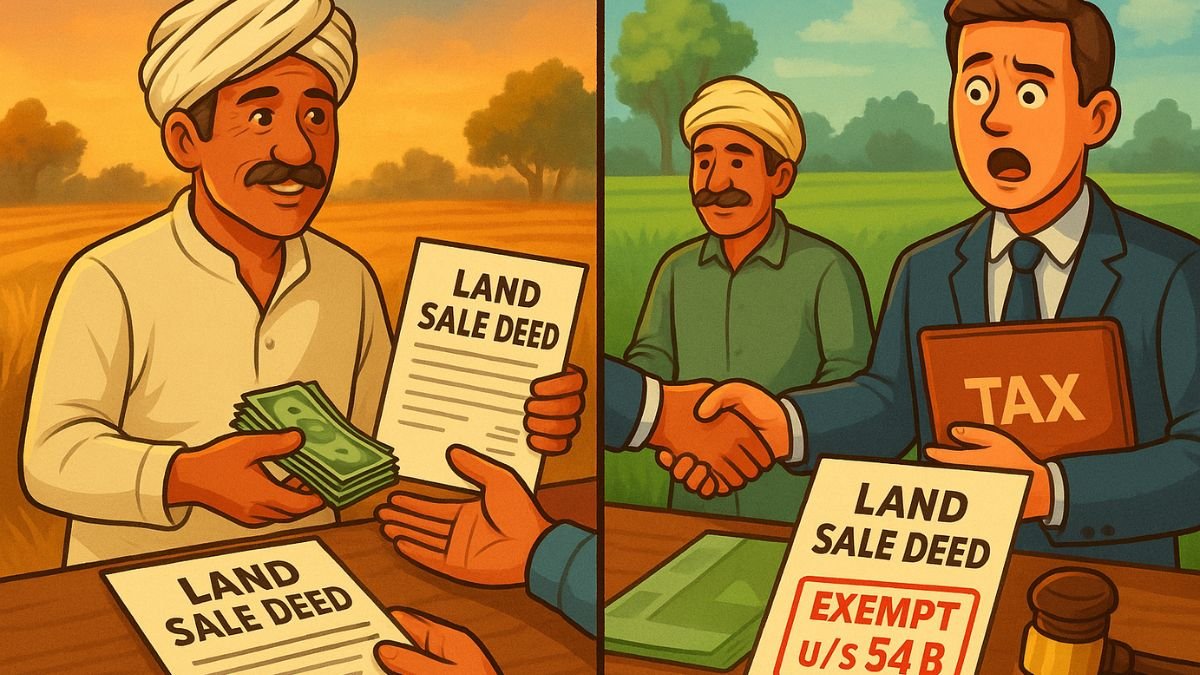
When it comes to selling agricultural land in India, many taxpayers fear the heavy tax impact from capital gains. However, the Income Tax Act, 1961 has a well-thought-out provision to offer relief in such cases — Section 54 B. “
Section 54B of the Income Tax Act provides a much-needed exemption on the sale of urban agricultural land, especially when the capital gains are reinvested wisely. This exemption is available only under specific conditions, & this article explains everything you need to know. "
🔍 What is Section 54B?
Section 54B of the Income Tax Act provides exemptions on capital gains from the sale of agricultural land used for farming by the taxpayer or their parents for at least two years before the date of transfer.
This section is relevant when:
- The land being sold is classified as agricultural land (urban or rural).
- The seller is an individual or a Hindu Undivided Family (HUF).
- The seller purchases another piece of agricultural land within 2 years of the date of sale.
If these conditions are met, capital gains tax exemption can be claimed under Section 54 B. "
🌾 When Can You Claim the Exemption?
A taxpayer selling agricultural land can claim capital gain exemption under Section 54B only if:
- The land was actively used for agricultural purposes for at least two years immediately preceding the date of transfer.
- The newly purchased land must also be used for agricultural purposes.
The capital gain on the transfer of land used for agricultural purposes can be exempted if reinvested correctly. Whether the land is located in an urban or rural area, the exemption will apply, though Section 54B specifically provides an exemption of capital gain arising on the sale of urban agriculture land. “
💰 How Much Capital Gain is Exempted?
Here's where it gets a little technical.
Let’s assume:
- You sell a piece of agricultural land & earn a capital gain of ₹25 lakh.
- You purchase a new agricultural land for ₹20 lakh within the permitted time.
Now, since the capital gain amount exceeds the cost of the land, the exemption will be allowed only to the extent of ₹20 lakh. The remaining ₹5 lakh will be taxable under long-term capital gains.
However, if the capital gain is less than or equal to the cost of the new land purchased, the entire gain is exempt.
📘 Example for Better Understanding
Let’s take a real-life scenario.
Mr. Ramesh sold a piece of urban agricultural land for ₹70 lakh. The indexed cost of acquisition was ₹30 lakh. So, the capital gain was ₹40 lakh.
He used ₹38 lakh to buy a new agricultural land within 12 months of selling the original land. Since he reinvested ₹38 lakh in another agricultural property, he can claim an exemption of ₹38 lakh under Section 54 B. The remaining ₹2 lakh will be taxable.
⚠️ Key Points & Conditions
- If the new agricultural land is sold within 3 years, the exemption claimed earlier will be reversed & added back to your taxable income.
- The new land must be in the name of the same assessee who sold the earlier land. You cannot claim exemption if you buy the new land in the name of a spouse or children.
- You must use the Capital Gains Account Scheme (CGAS) if you don’t invest before the due date of ITR filing.
📝 Documentation Required
- Sale deed of original agricultural land
- Proof of agricultural usage (revenue records or electricity bills)
- Sale agreement/purchase deed of new agricultural land
- Proof of payment (bank statement, receipt)
- If applicable, details of the Capital Gains Account
🔚 Conclusion
If you’re a farmer or a landowner planning to sell agricultural land, Section 54B of the Income Tax Act can help you avoid paying tax on capital gains, provided you reinvest in another agricultural land. Whether you’re selling urban agricultural land or land located on the outskirts of a city, this section ensures you don’t lose money in taxes if the proceeds are used for the same purpose — agriculture.
It’s always advisable to consult a tax expert or CA before filing, so that you can maximise your savings & ensure compliance with all the conditions of Section 54 B.











